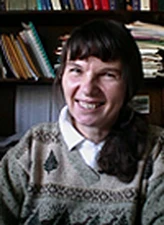Thérèse Encrenaz

The 2010 David Bates Medal is awarded to Thérèse Encrenaz for her outstanding works in Atmospheric Physics, Planetary Sciences and Infrared Molecular Spectroscopy, and editorial tasks and services for the planetary and space science community.
Thérèse Encrenaz obtained her PhD (Thèse d’état) in 1975, after studies and research at the Ecole Normale Supérieure, the University of Paris, the Goddard Institute for Space Studies and the Paris-Meudon Observatory. Her expertise covers the atmospheres of planets and comets (chemical composition, thermal structure), and the origin and evolution of solar system bodies. She has used advanced remote sensing techniques with infrared and mm spectrometry.
Key results include the determination of elemental and isotopic abundances in giant planets (C/H, D./H, H/He), the discovery and detection of mother molecules in comet Halley (CO2, hydrocarbons) and in planetary atmospheres (C2H2, C2H6, 15NH3, 12C13CH2, H2O and CO2 on Jupiter; NH3, C3H4, C4H2, CO2 and CH3 on Saturn ; H2O & CO on Uranus; CO, HCN, H2O, CO2 & C2H4 on Neptune; H2O2 and CH4 on Mars, etc…). She has been Co-investigator in planetary space missions, with active involvement on instruments like IKS on VEGA, ISM on PHOBOS, OMEGA and PFS on Mars Express, NIMS on Galileo, VIRTIS on Venus Express, HIFI on Herschel, VIRTIS on Rosetta & MIRO-Rosetta, SIMBIO-SIS on BepiColombo, etc. She has also served as mission scientist on ISO for solar system observations.
She has published about 200 refereed articles, 5 professional books, and 10 popular books. She has been awarded several prizes for her research activities and publications. She has been the director of the LESIA (former DESPA) Space Department (1992–2001) at the Observatoire de Paris. She is now vice-president of the Observatoire de Paris. She has participated in or chaired a number of national committees and European committees. She has been the chief editor for the journal Planetary and Space Science (2002–2007). She has played a leading role in the development of planetology in Europe.
